Falling Away – Italian Honeymoon, Part 5
While researching my 2015 trip to Italy with my mother, I was intrigued by the images I saw of the ancient hill town of Civita di Bagnoregio (pronounced “chee-vee-tah dee bahg-no-rej-e-o”). This mysterious village, situated on top of a steep hilltop, is known as the “dying city” since the clay turf that supports the city has been falling away almost since its inception. Little by little, pieces of the town have slowly eroded, tumbling down the cliffsides into the Valle dei Calanchi (Calanchi Valley) below. Experts believe the city will eventually collapse into ruins, never to be seen again.
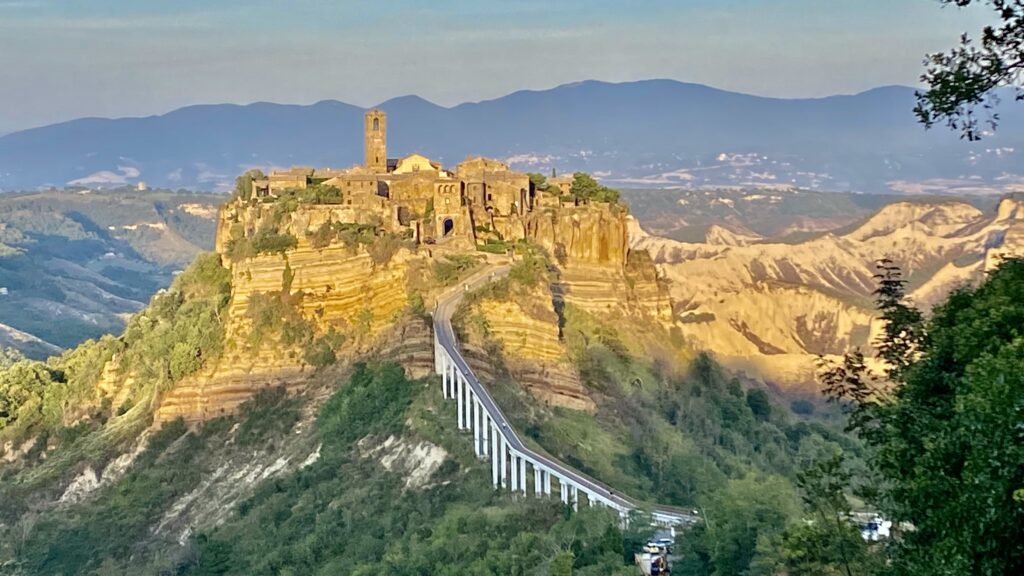
Still, images of the city are iconic – nestled amongst the clouds, surrounded by a vast valley on a lonely mountaintop, accessible only by a single trail that leads up to the village. While only fourteen residents reside in the tiny town, the site is vastly popular, drawing tourists worldwide.
Built approximately 2,500 years ago by the Etruscans, Civita was once a bustling village adjacent to its suburban cousin, Bagnoregio. Over time, wind, water, and even earthquake erosion prompted residents of this picturesque town to move away and into Bagnoregio or elsewhere with more stable terrain. While the earth below the city is comprised of a fragile tufa stone above a clay and sand base, the real enemy is rainwater, which enters fissures in the rock that supports the village and makes it even more delicate. Landslides are common, and experts predict a yearly land loss of approximately one centimeter. While that may not seem like much, every falling away leads to a potential fall down.
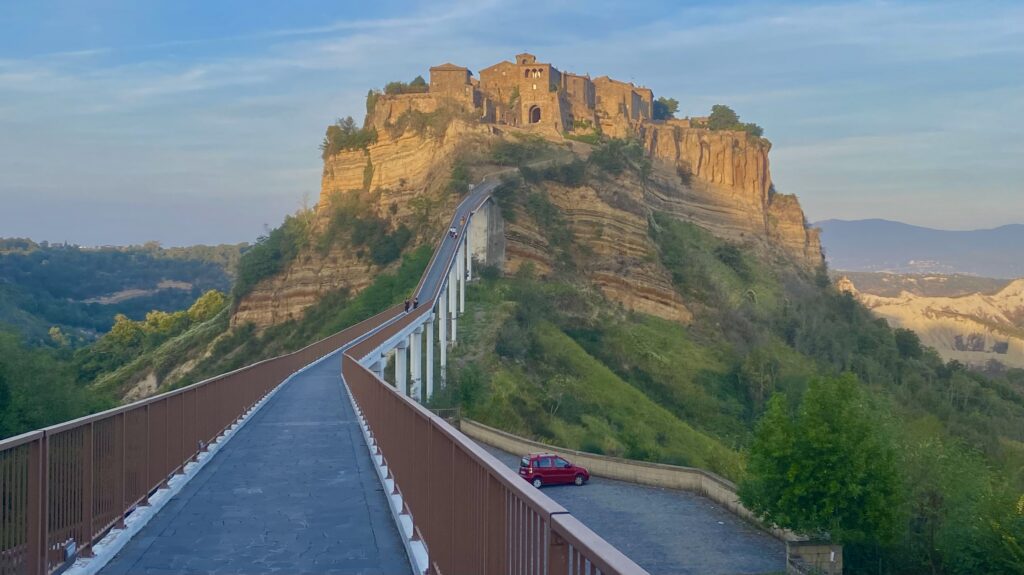
Couple the potential of losing your home to an unstable environment with the daily challenge of ascending and bringing supplies to one’s home, and it’s easy to understand why many of Civita’s residents left the ancient city. Quite frankly, accessibility is a challenge not just for arrival and departure but also for acquiring food and supplies. Vehicles aren’t allowed on the bridge. Anyone wishing to visit, work, and live in Civita must ascend to it similarly – on foot.
Mopeds and apes (small 3-wheeled trucks about the size of glorified golf carts) are the only vehicles allowed to traverse the bridge, and these may only travel as far as the last turn to the city – about forty feet beside and below the town itself. The rest of the distance must be walked and supplies carried. Everything that ascends and descends to and from the city must be brought up or down by one of the aforementioned devices or carried along the steep path that leads to it.
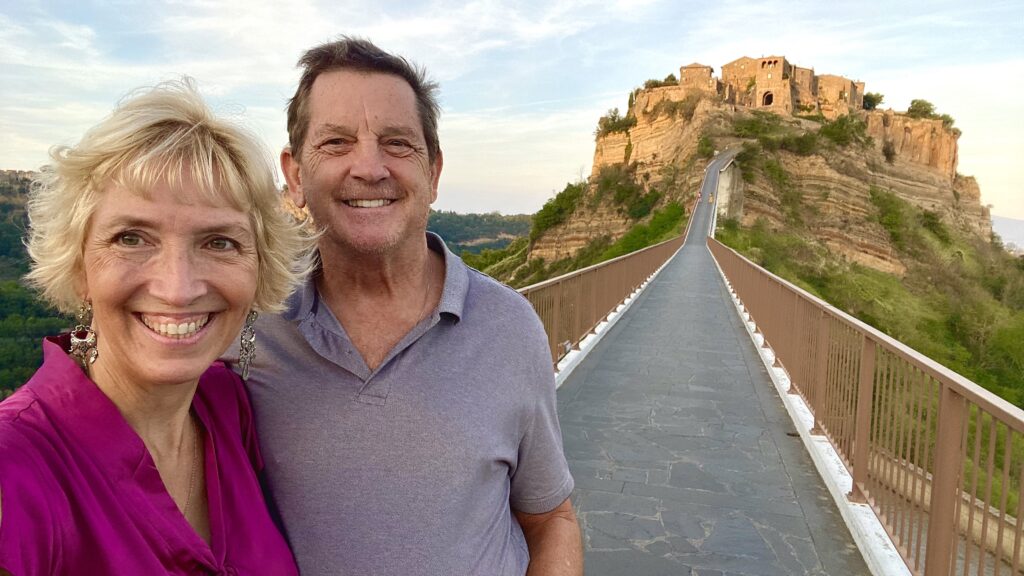
Anyone willing to hike into the town is welcome to visit. To do so, however, one must be prepared for a challenging journey. From the mainland-based parking lot situated above and beyond the entrance to Civita, one must descend roughly 150+ steep stone steps, walk down, pay a 5-Euro entrance fee, and then brave the cantilevered bridge that ascends to the city. Formerly a donkey trail, the 300-meter, 8-foot-wide, concrete walkway begins gently but then slopes dramatically up, becoming narrower and steeper as you reach the top path that veers left and still further up to ascend to the medieval town. The trek is not for anyone with mobility issues, fear of heights, or low fitness abilities.
While my mother and I planned to visit Civita in 2015, we missed the bus from nearby Orvieto and had to forego our plans. Determined to see this city with David during our 2023 honeymoon, we made the same trek – visiting Orvieto in the morning and then driving to nearby Bagnoregio in the afternoon. While the distance between the two cities is only 12 miles, the journey took us 45 minutes as the road continuously winds back and forth around the remote mountainous region.
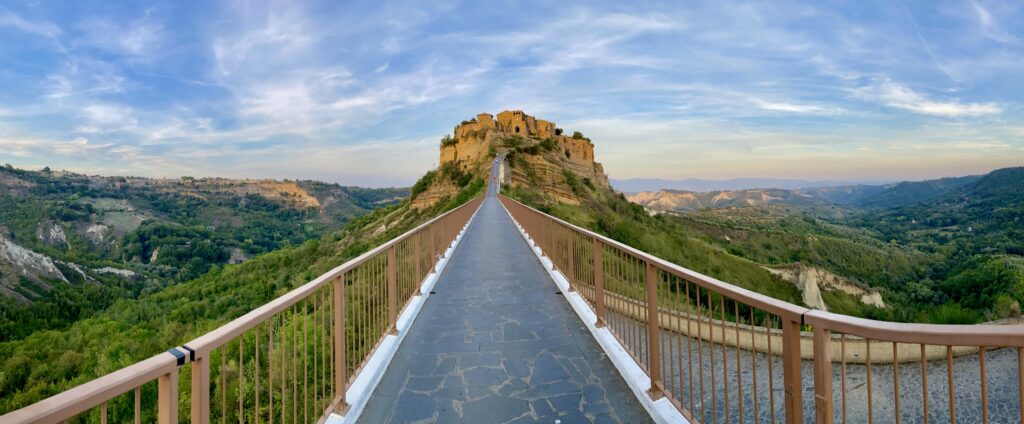
By the time David and I arrived, daylight was perilously close to fading, and we still had about a half-hour walk to arrive at the footbridge. While David has no fear of heights, I can’t say the same. The higher we climbed to the city, the more my nerves took over.
Upon arrival, imagine my surprise after witnessing a young cat jumping onto the elevated village wall. After pointing the kitty out to David, I warned him not to get too close for fear that the cat might fall over the edge and down to its death. While that thankfully never happened, I remained worried about it until spotting another cat outside the wall during our descent. Seeing the cat in this location made me realize the danger wasn’t quite as pronounced as I’d thought.
Looking back now, I wonder how many of us are like the residents of that town. Do we seek to live on the stable ground of God’s Word, or do we prefer the fragile ground that the world offers, sometimes fraught with pleasure but inevitably leading to destruction? It reminds me of Christ’s parable of the foolish man who built his house on the sand rather than the rocks, where the wise man chose to dwell.
As Jesus explained in Matthew 7: 24-27, “Therefore everyone who hears these words of mine and puts them into practice is like a wise man who built his house on the rock. The rain came down, the streams rose, and the winds blew and beat against that house; yet it did not fall, because it had its foundation on the rock. But everyone who hears these words of mine and does not put them into practice is like a foolish man who built his house on sand. The rain came down, the streams rose, and the winds blew and beat against that house, and it fell with a great crash.”
A more significant consideration is the falling away of the Church in the end times. The New King James Version explains it like this: “Let no one deceive you by any means; for that Day will not come unless the falling away comes first, and the man of sin is revealed, the son of perdition.” (2 Thessalonians 2:3). The New American Standard version uses the word “apostasy” to mean “falling away.” “No one is to deceive you in any way! For it will not come unless the apostasy comes first, and the man of lawlessness is revealed, the son of destruction.”
Apostasy can be defined as walking or falling away from a formerly professed belief in religion, principles, or even politics. More than just raising doubt, apostates denounce the previously held ideals or faith that were once important to them.
Increasingly, formerly devout Christians are walking away from the gospel – including once-proclaimed leaders of the faith. Joshua Harris, author and former pastor of a mega-church in Maryland, shocked the Christian community by writing, “I have undergone a massive shift in regard to my faith in Jesus. The popular phrase for this is ‘deconstruction,’ the biblical phrase is ‘falling away.’ By all the measurements that I have for defining a Christian, I am not a Christian.”
Joining Josh Harris is Dave Gass, pastor of Covenant Church and Cedar Community Church, who wrote, “After 40 years of being a devout follower, 20 of those being an evangelical pastor, I am walking away from the faith. Even though this has been a massive bomb drop in my life, it has been decades in the making.”
Controversial Bishop Carlton E. Pearson lost a considerable portion of his following while gaining others in 2004 when he denounced his belief in the existence of hell and developed what he later deemed the “Gospel of Inclusion.” Explaining his seismic shift from evangelicalism to inclusionism, Pearson said he was “not trying to correct anybody [but] just enhance everybody — who you already are, bringing out the best in you, celebrate own honor, respect, love yourself, and be yourself.”
From his deathbed in December 2023, Pearson maintained his belief that everyone would go to Heaven. “I’ll never stop thinking of who you are, and why you are, and how somehow, we were divinely drawn together in this divine intersection of lives. But I feel you, and I hope you feel me even when I’m in Heaven, or on the other side, or the other iteration.”
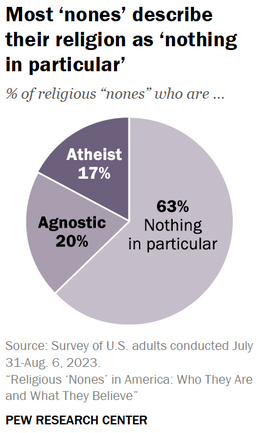
Even more disturbing than losing spiritual leaders to apostasy is the steady increase of those who affirm themselves as believers of “nothing in particular.” According to a recent Pew Research Poll, a higher percentage of those polled believe in “nothing” rather than traditional religion, atheism, or agnosticism. A shocking 63% of respondents believe in nothingness, now classified as the “nones” for checking this box for religious affiliation.
As Pew Research explains, “Most ‘nones’ say they were raised in a religion, usually Christianity. Yet today, they tend to be disconnected from religious institutions. Not only have they shaken off religious labels, but they also have largely shaken off involvement in churches, synagogues, mosques, and other religious organizations.” One could easily argue that these “nones” are then actually today’s apostates -raised to believe in Christ, yet now proclaiming no faith at all.
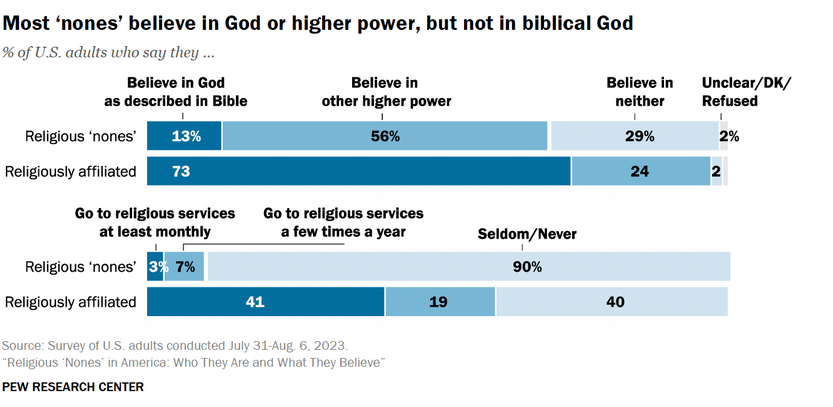
And so, I say, at what peril? How has our world so steadily chosen to live on this fragile ground? How did we get here?
David Jeremiah speaks of this end-times phenomenon by explaining that many Christians fall away because Satan deceives them. 1 Timothy 4:1 says, “The Spirit clearly says that in later times some will abandon the faith and follow deceiving spirits and things taught by demons.”
Pastor Jeremiah continues by saying that others will leave their faith out of disillusionment during times of testing. “They’re not looking for a Savior. They’re looking for a solution. They want the blessings of belief without having to swim against the cultural stream.”
Additional so-called believers fall away out of distraction by the world. David Jeremiah describes these individuals as those who “let go of their faith in order to grab all that the world has. They grab with both hands and there’s nothing left to hold onto Jesus with.”
Not unlike the slow falling away of the ancient city of Civita, many believers allow the world, the devil, or even their troubles to pull the ground out from underneath them. As Christians, we can’t let that happen.
Philippians 2:12 admonishes us, “Therefore, my dear friends, as you have always obeyed–not only in my presence, but now much more in my absence–continue to work out your salvation with fear and trembling.” This verse doesn’t tell us to be afraid but to remain steadfast in our faith, remembering with awe, wonder, and respect how great God and His gift of grace are. I know I never could – and I hope you won’t either.
Joshua said it best in his address to the often feckless Israelite nation, “But if serving the Lord seems undesirable to you, then choose for yourselves this day whom you will serve, whether the gods your ancestors served beyond the Euphrates, or the gods of the Amorites, in whose land you are living. But as for me and my household, we will serve the Lord.” (24:15)
To that, I can only say, “Amen.”